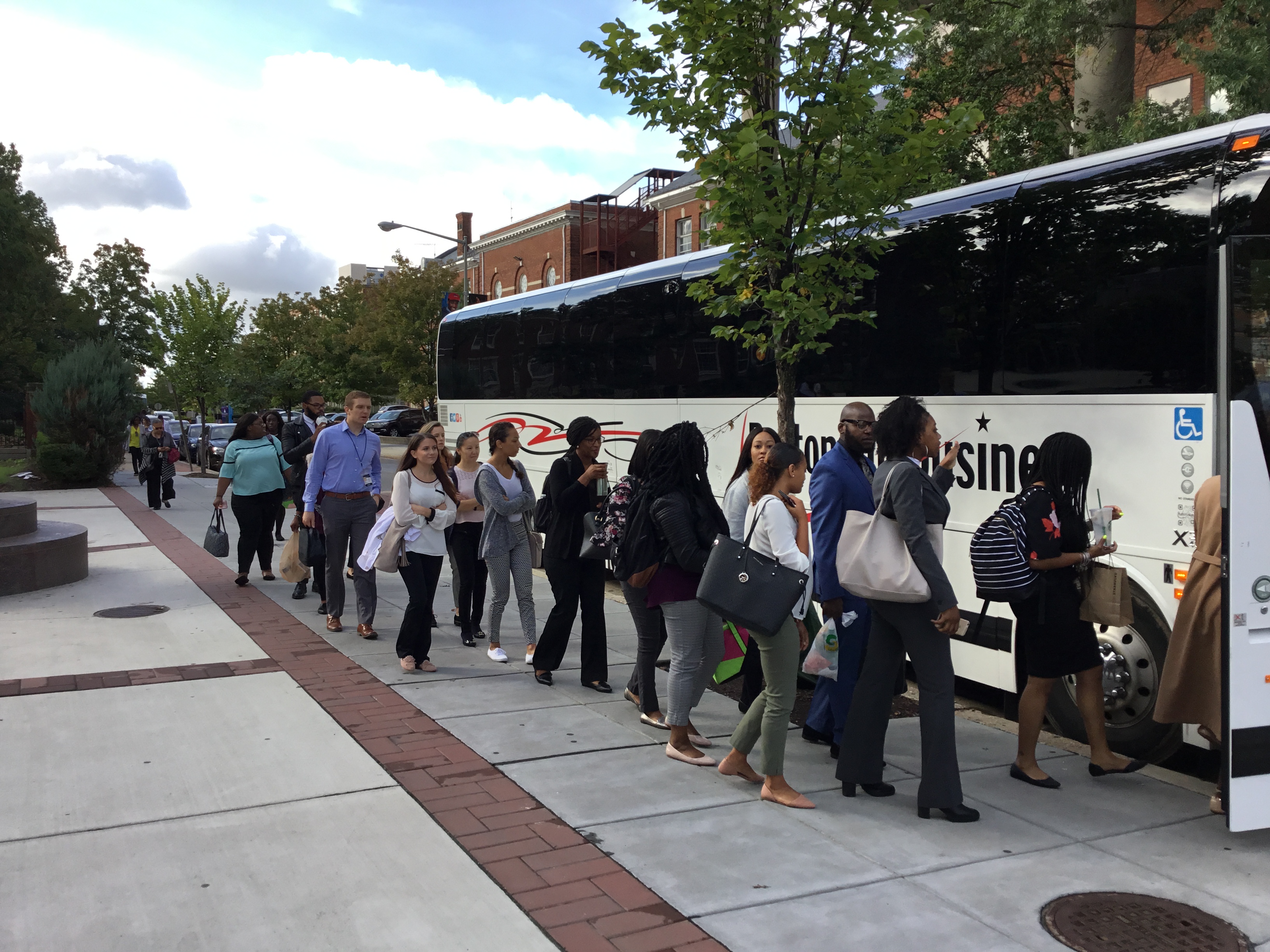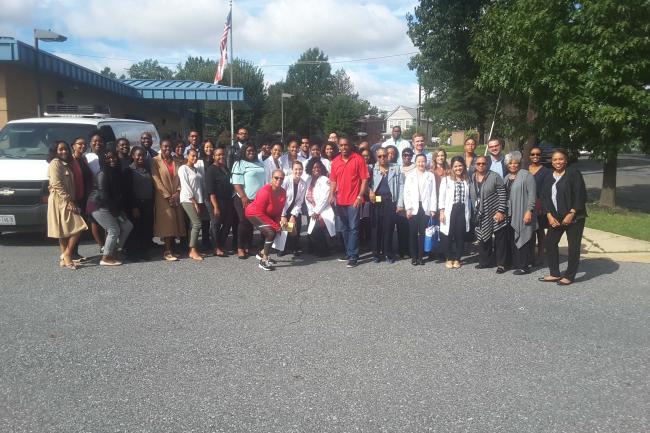WASHINGTON (October 31, 2018) — Howard University held its Annual Interprofessional Bus Tour in partnership with health facilities in the area to give students an inside look at the most pressing issues impacting the district’s social and health care outcomes. A charter bus carried Howard University students and faculty, representing multiple disciplines, through wards seven and eight. Both wards are home to some of the most underserved neighborhoods in Washington, DC.
“With this effort, we sought to educate students about the areas where people are most underserved,” says Interprofessional Bus Tour Clinical Content Expert Ruby M. Gourdine, D.S.W, who also serves as a professor of social work. “Based on the data we collected in the district, we found that these areas had the most deeply concerning health outcomes. For example, wards seven and eight are communities east of the Anacostia, with a total of 479,750 residents but only three grocery stores. They are considered food insecure or food deserts. This, and other outcomes, led us to focus on these areas.”
 The university’s social work students were largely represented on the tour, but the effort truly was an interprofessional one. Students and faculty in dentistry, pharmacy, physical therapy, psychology, and education joined the guided tour that stopped at four agencies along the way. Stops included Congress Heights Senior Wellness Center, Wellness Health Care Clinics, LCC, Family and Medical Counseling Services, and the East River Family Strengthening Collaborative.
The university’s social work students were largely represented on the tour, but the effort truly was an interprofessional one. Students and faculty in dentistry, pharmacy, physical therapy, psychology, and education joined the guided tour that stopped at four agencies along the way. Stops included Congress Heights Senior Wellness Center, Wellness Health Care Clinics, LCC, Family and Medical Counseling Services, and the East River Family Strengthening Collaborative.
“During the bus tour, we revealed the statistical data we collected to students- most of which we knew the students wouldn’t have already known,” Gourdine explained. “As we gave the statistical point of view, the agencies talked in depth about their services and the needs in the community, which gave students an opportunity to ask questions and make their own assessment of the services.”
Students who participated in the tour were asked to take a pre-tour and post-tour test on demographic data, income, location, and access to food and health care professionals. This helped to evaluate the effectiveness of the tour in strengthening student’s knowledge and analysis of the issues examined on the tour.
“We received overwhelming feedback from students saying they learned so much and received information they did not know about wards seven and eight,” says Health Resource and Services Administration (HRSA) Principal Investigator Janice Berry-Edwards, M.S.W., Ph.D., who also serves as an associate professor of social work. The HRSA grant funded the bus tour. “Looking at the data they submitted, they had lower scores on the pre-test and much higher scores on the post-test. Additionally, students were very vocal during the tour and it was clear that they took advantage of this opportunity to connect with students from other disciplines they had never talked to before.”
Other data gathered for the purposes of the Interprofessional Bus Tour is included below:
- Since 2010, four grocery stores have closed in wards seven and eight. While other wards in Washington, DC have six grocery stores per ward on average, wards seven and eight have just three grocery stores.
- The median income in wards seven and eight dropped from $28,979 to $24,096 between 2010 and 2015. Wards seven and eight had the lowest income levels across Washington, DC.
- Spending for housing, homeless services, and education increased in wards seven and eight in 2018.
- Child poverty rates, declined city-wide overall in the district since 2010, but not consistently year-to-year.
- Teen pregnancy rates decreased from 2010 to 2015 (a noted improvement in wards 7 and 8 2010-2015).
- Standardized test scores increased slightly from 2010 to 2015.
“Social work has historically worked with interdisciplinary teams because of the recognition that there are many touch points for quality service delivery,” says Howard University School of Social Work Dean Sandra Edmonds-Crewe, M.S.W., Ph.D. The interdisciplinary bus tour provided different disciplines the opportunity to interact and collectively experience the impact of disparities and structural inequalities on well-being. The HRSA grant supported this activity as a key opportunity to prepare a culturally-intelligent behavioral health care team that uses the strengths perspective in delivering quality care.”
The Interprofessional Bus Tour is funded by HRSA grant number M01HP31303. The multi-year grant awarded to the university includes an initial grant of $1.3 million over four years and includes an additional $400,000 of supplemental funding to work with families experiencing opioid and other addictions, totaling $1.7 million.
# # #
About Howard University
Founded in 1867, Howard University is a private, research university that is comprised of 13 schools and colleges. Students pursue studies in more than 120 areas leading to undergraduate, graduate and professional degrees. The University operates with a commitment to Excellence in Truth and Service and has produced four Rhodes Scholars, 11 Truman Scholars, two Marshall Scholars, one Schwarzman Scholar, over 70 Fulbright Scholars and 22 Pickering Fellows. Howard also produces more on-campus African-American Ph.D. recipients than any other university in the United States. For more information on Howard University, visit www.howard.edu.
Media Contact: Misha Cornelius, misha.cornelius@howard.edu





